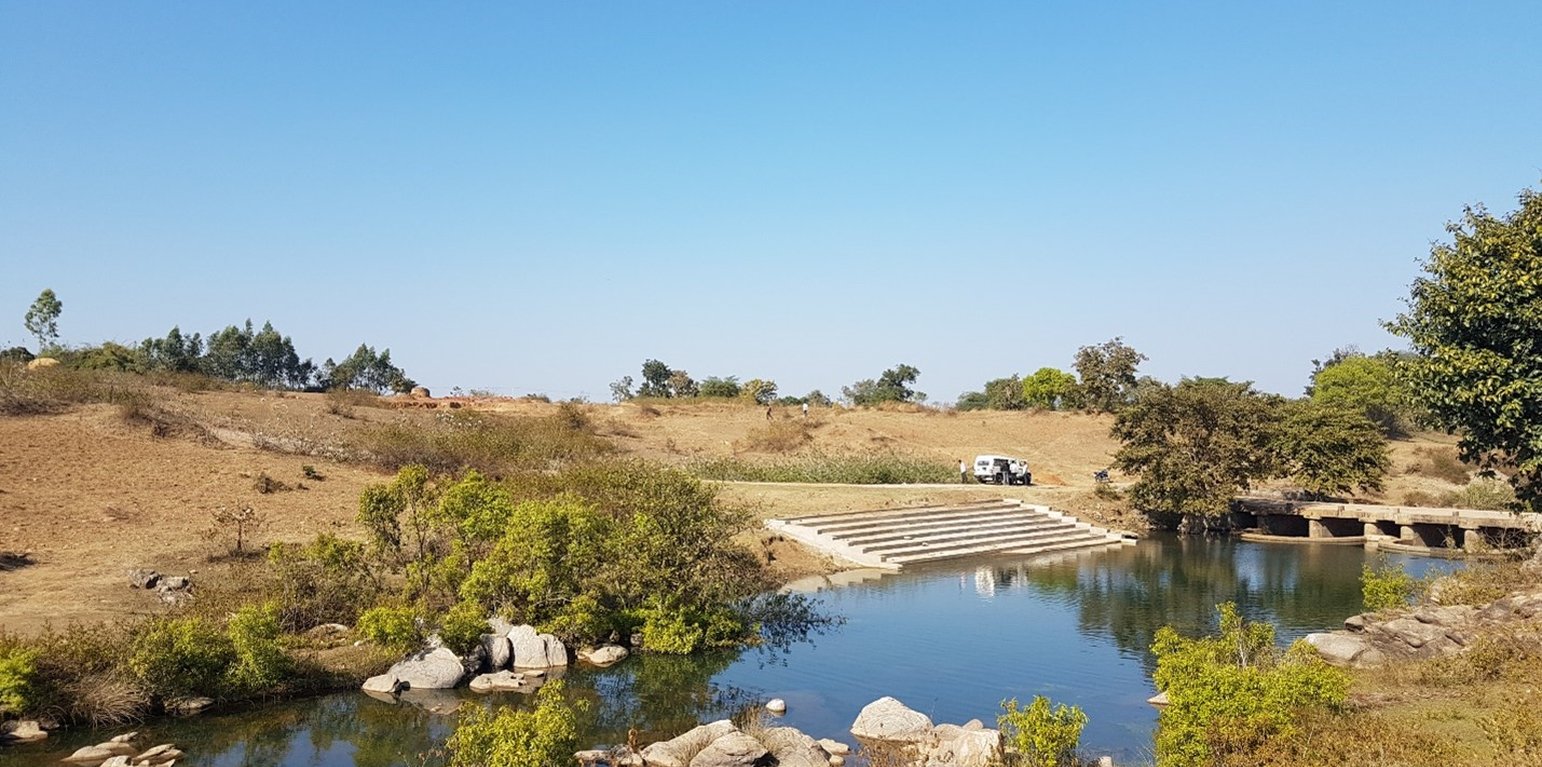Experiential Learning Tools for Sustainable Water Management
(ອິນເດຍ)
Experiential Learning Tools
ຄຳອະທິບາຍ
The project “Scaling up experiential learning tools for sustainable water governance in India” aimed at enhancing sustainable water management at scale by improving the capacities of 1,500 rural communities covering 105,000 households directly and 2,000 communities covering 140,000 households indirectly in six Indian states to manage water more sustainably. This was achieved through experiential learning from collective action games, structured community debriefings, and participatory water planning tools that contribute to greater awareness and improved governance, inducing behavioural change toward more sustainable water governance and management.
The work was jointly conducted by the Foundation for Ecological Security, India (FES), the International Food Policy Research Institute (IFPRI) and the International Crops Research Institute for the Semi-Arid Tropics (ICRISAT).
The project team adopted a holistic approach to water governance, considering the complex interconnections between water, land, livelihoods, people, and institutions. Rather than viewing groundwater in isolation, the team promoted the conjunctive use of surface and groundwater for irrigation, integrating both supply- and demand-side strategies to water management. Their approach included harnessing data, experiential learning, capacity building, participatory planning, and strategic communication to initiate behavioural change among actors at both community and broader levels.
At the community level, the team focused on shifting behaviour towards sustainable water use by farmers and local communities. They employ tools like the Groundwater Monitoring Tool (GWMT) for collective resource monitoring, experiential learning games and debriefing for social learning, and Crop Water Budgeting (CWB) for participatory water management, sensitization to leveraging funds of the Mahatma Gandhi National Rural Employment Guarantee Scheme (MGNREGS), scientific and participatory planning through the Composite Landscape Assessment and Restoration Tool (CLART). These tools aim at enhancing the understanding of water as a shared resource, at developing the capacity of community resource persons, at fostering collective decision-making, and at encouraging the adoption of water-efficient practices.
Aiming to influence higher-level actors, the project engaged in multi-actor platforms (MAPs) and built coalitions to promote collaborative water governance. These platforms facilitated discussions among various stakeholders, aiming to bridge governance gaps and encourage coordinated actions. The project also provided training to civil society, government, and private sector actors on water governance, equipping them with the knowledge and tools necessary to adopt sustainable practices.
Overall, the project aimed at creating a web of interconnected interventions that influence the behaviour of stakeholders across different levels, ultimately leading to improved water governance and sustainable resource management.
ສະຖານທີ່
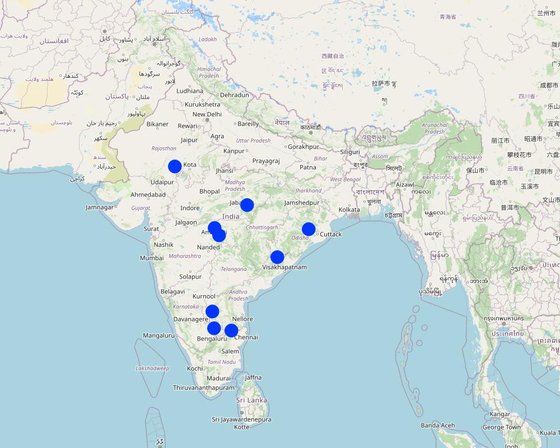
ສະຖານທີ່: Chittoor and Anantpur District of Andhra Pradesh, Bhilwara district of Rajasthan, Mandala District of Madhya Pradesh, Anugul and Koraput district of Odisha, Chikbalapur district of Karnataka, Yavatmal and Amaravati District of Maharashtra, Andhra Pradesh, Rajasthan, Karnataka, Odisha, Maharashtra, and Madhya Pradesh States of India, ອິນເດຍ
ການຄັດເລືອກພື້ນທີ່ ທີ່ອີງໃສ່ຂໍ້ມູນທາງພູມີສາດ
-
77.60971, 14.68202
-
77.74149, 13.41404
-
74.65035, 25.37698
-
77.77832, 20.9218
-
78.15186, 20.39753
-
80.36011, 22.60019
-
82.72603, 18.7974
-
85.15966, 20.84019
-
79.10302, 13.24278
ວັນທີເລີ່ມຕົ້ນ: 2013
ປີຂອງການສິ້ນສຸດ: n.a.
ປະເພດຂອງແນວທາງ
-
ພື້ນເມືອງ / ທ້ອງຖີ່ນ
-
ການລິເລີ່ມ ພາຍໃນປະເທດ ທີ່ຜ່ານມາ / ນະວັດຕະກໍາ
-
ພາຍໃຕ້ໂຄງການ / ແຜນງານ
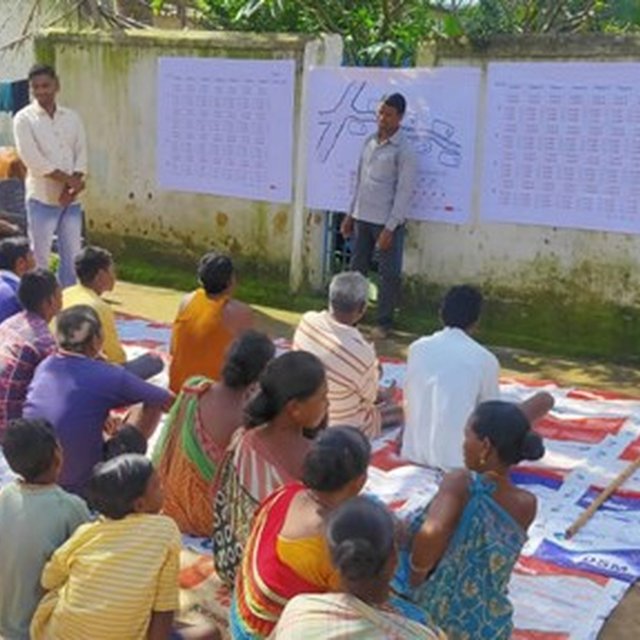
Channel Irrigation Game (Dron C)
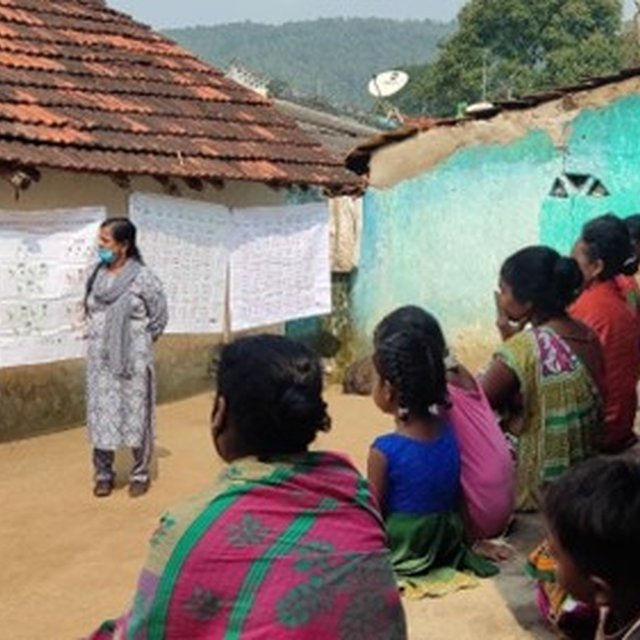
Surface Water Game (Dron C)
ເປົ້າໝາຍຂອງແນວທາງ ແລະ ການປົກປັກຮັກສາສິ່ງແວດລ້ອມ
ເປົ້າໝາຍ / ຈຸດປະສົງຫຼັກໃນການຈັດຕັ້ງປະຕິບັດແນວທາງ
The approach shall support sustainable land management practices that reduce the proportion of land that is degraded. This contributes to improved food security and strengthens resilience and adaptive capacity of communities through improved water management and irrigation. The approach embeds the ambition to empower women and marginalized groups in their contributions to agriculture and society in general.
These impact ambitions shall be achieved through behavioural changes in three domains:
1. Water supply side provisioning actions (mainly investments in and maintenance of minor water harvesting structures, such as dams, tanks, or small check dams).
2. Institutional service provision actions (mainly participatory formulation and enforcement of local by-laws on water management).
3. Water appropriation actions (mainly the use of water efficient agricultural technologies, esp. the consideration of crop water requirement in crop choices).
The outcomes of the interventions are seen in the light of needs and capacities of marginalized groups, esp. women and youth. The behavioural changes shall be achieved by influencing the system understanding and norms using the systemic experiential learning approach outlined above.
ເງື່ອນໄຂທີ່ສະໜັບສະໜູນໃຫ້ການຈັດຕັ້ງປະຕິບັດເຕັກໂນໂລຢີ ບົນພື້ນຖານແນວທາງ
-
ສັງຄົມ / ວັດທະນະທໍາ / ມາດຕະຖານ ແລະ ຄຸນຄ່າທາງສາສະໜາ: 1. Legal quota for women representation in local government bodies.
2. Inclusion of women farmers who are involved in selection of crops at household level and in decisions on the maintenance of common water infrastructures.
-
ການກໍ່ຕັ້ງສະຖາບັນ: The Mahatma Gandhi National Rural Employment Guarantee Scheme (MGNREGS) can be leveraged to support sustainable water management.
-
ການຮ່ວມມື / ການປະສານງານຂອງຜູ້ກ່ຽວຂ້ອງ: A cross-sectoral alliance called “The Promisse of Commons” creates a strong movement also with regards to sustainable water management.
-
ກ່ຽວກັບກົດໝາຍ (ສິດນໍາໃຊ້ດິນ, ສິດນໍາໃຊ້ນໍ້າ): Recent revisions of Government support mechanisms such as minimal support prices also include water efficient crops.
-
ນະໂຍບາຍ: 1. Diverse Central Government and State level policies, guidelines and regulations support participatory and sustainable watershed management.
2. Policies that favour participatory management of water resources and focus on behaviour change such as Atal Bhujal Yojana.
3. Policies that support zoning of rice production based on water tables.
-
ຄວາມຮູ້ກ່ຽວກັບການຄຸ້ມຄອງ ທີ່ດິນແບບຍືນຍົງ, ການເຂົ້າເຖິງການສະໜັບສະໜູນ ທາງດ້ານວິຊາການ: Watershed interventions have a long history in India and there is widespread knowledge about sustainable soil-water management practices
-
ຕະຫຼາດ (ໃນການຊື້ວັດຖຸດິບ, ຂາຍຜະລິດຕະພັນ) ແລະ ລາຄາ: Supporting development of market opportunities for less-water consumptive crops and their products.
-
ວຽກ, ມີກໍາລັງຄົນ: The Mahatma Gandhi National Rural Employment Guarantee Scheme (MGNREGS) also supports work of local communities on soil-water management.
ເງື່ອນໄຂທີ່ເຊື່ອງຊ້ອນໃຫ້ການຈັດຕັ້ງປະຕິບັດເຕັກໂນໂລຢີ ບົນພື້ນຖານແນວທາງ
-
ສັງຄົມ / ວັດທະນະທໍາ / ມາດຕະຖານ ແລະ ຄຸນຄ່າທາງສາສະໜາ: Depending on the state, social norms prevent women to freely speak in the presence of men.
-
ການກໍ່ຕັ້ງສະຖາບັນ: 1. Subsidies (especially on energy) and other support mechanisms discourage sustainable water management.
2. Changing rules about water use sometimes requires longer time for deliberation and policy making.
-
ການຮ່ວມມື / ການປະສານງານຂອງຜູ້ກ່ຽວຂ້ອງ: Multiple stakeholders often act in their own silos.
-
ກ່ຽວກັບກົດໝາຍ (ສິດນໍາໃຊ້ດິນ, ສິດນໍາໃຊ້ນໍ້າ): Water rights are connected to land rights creating the widespread perception that water underneath ones land can be used without restrictions.
-
ນະໂຍບາຍ: 1. Policies that give price guarantees by way of a minimum support price for farmers for growing water intensive crops.
2. Energy subsidies encourage intensive groundwater pumping.
-
ຄວາມຮູ້ກ່ຽວກັບການຄຸ້ມຄອງ ທີ່ດິນແບບຍືນຍົງ, ການເຂົ້າເຖິງການສະໜັບສະໜູນ ທາງດ້ານວິຊາການ: Most implementing organizations including the government focus on supply side water management interventions.
-
ຕະຫຼາດ (ໃນການຊື້ວັດຖຸດິບ, ຂາຍຜະລິດຕະພັນ) ແລະ ລາຄາ: 1. Consumer preferences favor water intensive commodities.
2. Rising salary level for farm labor
-
ວຽກ, ມີກໍາລັງຄົນ: Low labor requirements of flood-irrigated rice production make many farmers prefer this water-consumptive cropping system compared to more water-efficient production systems.
ການມີສ່ວນຮ່ວມ ແລະ ບົດບາດຂອງພາກສ່ວນທີ່ກ່ຽວຂ້ອງທີ່ມີສ່ວນຮ່ວມ
ພາລະບົດບາດຂອງພາກສ່ວນທີ່ກ່ຽວຂ້ອງ ທີ່ມີສ່ວນຮ່ວມໃນການຈັດຕັ້ງປະຕິບັດແນວທາງ
| ແມ່ນໃຜ / ພາກສ່ວນໃດ ທີ່ເປັນເຈົ້າການ ໃນການຈັດຕັ້ງປະຕິບັດ ວິທີການ? |
ລະບຸ ພາກສ່ວນທີ່ກ່ຽວຂ້ອງ |
ພັນລະນາ ບົດບາດ ໜ້າທີ່ ຂອງພາກສ່ວນທີ່ກ່ຽວຂ້ອງ |
| ຜູ້ນໍາໃຊ້ດິນໃນທ້ອງຖິ່ນ / ຊຸມຊົນທ້ອງຖິ່ນ |
Farmers who are using common or private water resources for cultivation of post rainy-season crops. |
Building the capacity of water resource (Private or common) user. |
| ອົງການຈັດຕັ້ງ ພາຍໃນຊຸມຊົນ |
1. Foundation for Ecological Security (FES)
2. Water User Associations
3. Farmers groups
4. Women self-help groups
5. Pasture land development committees
6. SLM specialists / agricultural advisors
7. Sanjeevani Institute for Empowerment and Development (SIED)
8. PRADAN
9. VIKSAT
10. Reliance Foundation
11. Swadesh Foundation |
Building the capacity of water resource (Private or common) user |
| ຜູ້ຊ່ຽວຊານ ການນຄຸ້ມຄອງ ທີ່ດິນແບບຍືນຍົງ / ທີ່ປຶກສາດ້ານກະສິກໍາ |
IFPRI (https://www.ifpri.org)
ICRISAT (https://www.icrisat.org)
FES (https://fes.org.in) |
Technical support to the design of the approach |
| ພາກເອກະຊົນ |
Cotton Connect (https://www.cottonconnect.org/) |
Cotton Connect provide farmers with the training, education and tools they need to improve their productivity, income and profitability. |
| ອົງການຈັດຕັ້ງ ສາກົນ |
1. International Food Policy Research Institute, IFPRI
2. International Crops Research Institute for the Semi-Arid Tropics, ICRISAT |
Supporting with agricultural and food policy research |
| Government Partners |
1. Atal Bhujal Yojana National Program Management Unit (NPMU),
2. Odisha Agriculture Department & Odisha Livelihoods Mission |
The goal of Atal Bhujal Yojana (Atal Jal) is to demonstrate community-led sustainable groundwater management which can be taken to scale. The major objective of the scheme is to improve the management of groundwater resources in selected water-stressed areas and states.
Odisha Livelihood Mission has put in place a dedicated and sensitive support structure, to take the rural poor households out of poverty line trough capacity building, financial assistance and self-reliant institutions. |
ອົງການທີ່ເປັນຕົວແທນໃນການຈັດຕັ້ງປະຕິບັດ
Foundation for Ecological Security (Pratiti Priyadarshini)
ການລວບລວມເອົາຜູ້ນໍາໃຊ້ທີ່ດິນໃນທ້ອງຖິ່ນ/ຊຸມຊົນທ້ອງຖິ່ນ ໃນການຈັດຕັ້ງປະຕິບັດແນວທາງ ແຕ່ລະໄລຍະ
ບໍ່ມີ
ການບໍ່ປະຕິບັດ
ການຊ່ວຍເຫຼືອຈາກພາຍນອກ
ການຮ່ວມມື
ການນໍາໃໍຊ້ເອງ
ການເລີ່ມຕົ້ນ / ແຮງຈູງໃຈ
The Foundation for Ecological Security (FES) has local presence in the Districts targeted with direct interventions. The NGO expressed the need for advancing their toolbox through established and trustful relations to local communities, FES consulted communities regarding their main water management challenges. The results of these consultations formed the basis for the design of the intervention strategy and the development of the approach. Specific communities were selected based on their interest in improving water management and the severeness of water management challenges they face. Within the villages, especially households living close to water resources and enjoying benefit from the water resources and farmers who own private groundwater pumps were invited to participate in activities.
ການວາງແຜນ
The planning of the implementation of interventions was mainly done by the project partners, most importantly the Foundation for Ecological Security. FES trained local community members to become Community Resource Person (CRP). CRPs organize the implementation of specific interventions in interaction with community members.
ການປະຕິບັດ
Community members actively participated in experiential learning games, participatory crop water budgeting, the participatory planning of water infrastructure investments using CLART, focus group discussions, debriefings and bilateral interactions.
ຕິດຕາມກວດກາ / ການປະເມີນຜົນ
After the interventions, CRPs work closely with the communities and, if needed, FES helps community members to formulate or revise water rules and by-laws. Community members monitor the water table of their wells.
ແຜ່ນວາດສະແດງ
Interconnections between actors and interventions
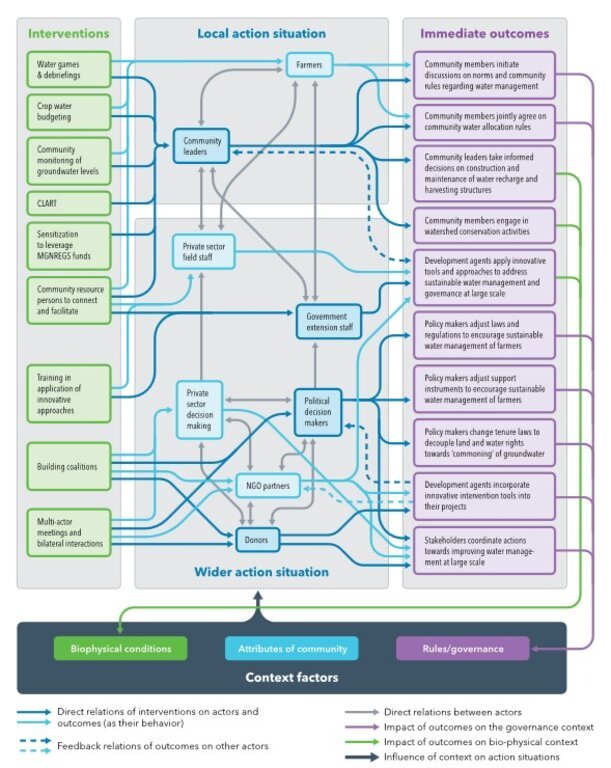
ຜູ້ຂຽນ: Sanil, Falk, Meinzen-Dick, Priyadarshini (2024)
ການຕັດສິນໃຈໃນການເລືອກເຕັກໂນໂລຢີ ການຄຸ້ມຄອງທີ່ດິນແບບຍືນຍົງ
ການຕັດສິນໃຈໂດຍ
-
ຜູ້ນໍາໃຊ້ດິນຜູ້ດຽວ (ການລິເລີ່ມດ້ວຍຕົນເອງ)
-
ຜູ້ນໍາໃຊ້ທີ່ດິນຫຼັກ, ການສະໜັບສະໜູນ ໂດຍຜູ້ຊ່ຽວຊານ ການນໍາໃຊ້ທີ່ດິນແບບຍືນຍົງ
-
ພາກສ່ວນກ່ຽວຂ້ອງທັງໝົດ, ເປັນສ່ວນໜຶ່ງ ຂອງວິທີທາງແບບມີສ່ວນຮ່ວມ
-
ຜູ້ຊ່ຽວຊານ ຫຼັກດ້ານການຄຸ້ມຄອງ ທີ່ດິນແບບຍືນຍົງ, ມີການຕິດຕາມປຶກສາຫາລືກັບຜູ້ນໍາໃຊ້ທີ່ດິນ
-
ຊຽ່ວຊານ ສະເພາະດ້ານການຄຸ້ມຄອງ ດິນແບບຍືນຍົງຜູ້ດຽວ
-
ນັກການເມືອງ / ຜູ້ນໍາ
ການຕັດສິນໃຈບົນພື້ນຖານ
-
ປະເມີນເອກກະສານ ຄວາມຮູ້ກ່ຽວກັບ ການຄຸ້ມຄອງ ທີ່ດິນແບບຍືນຍົງ (ຫຼັກຖານທີ່ຊ່ວຍໃນການຕັດສິນໃຈ)
-
ຜົນທີ່ໄດ້ຮັບ ຈາກການຄົ້ນຄວ້າ
-
ປະສົບການສ່ວນບຸກຄົນ ແລະ ຄວາມຄິດເຫັນ (ທີ່ບໍ່ເປັນເອກກະສານ)
-
•Experience of CRPs and local key informants; Lessons and highlights emerging from diagnostic and consultation processes
ການສະໜັບສະໜູນເຕັກໂນໂລຢີ, ການສ້າງຄວາມອາດສາມາດ ແລະ ການຄຸ້ມຄອງຄວາມຮູ້
ກິດຈະກຳ ດັ່ງລຸ່ມນີ້ ແມ່ນເປັນພາກໜຶ່ງຂອງແນວທາງ
-
ການສ້າງຄວາມສາມາດ / ການຝຶກອົບຮົມ
-
ການບໍລິການໃຫ້ຄໍາປຶກສາ
-
ສະຖາບັນການສ້າງຄວາມເຂັ້ມແຂງ (ການພັດທະນາອົງການຈັດຕັ້ງ)
-
ຕິດຕາມກວດກາ ແລະ ປະເມີນຜົນ
-
ການຄົ້ນຄວ້າ
ການສ້າງຄວາມອາດສາມາດ / ຝຶກອົບຮົມ
ໄດ້ສະໜັບສະໜູນຝຶກອົບຮົມໃຫ້ແກ່ພາກສ່ວນກ່ຽວຂ້ອງດັ່ງລຸ່ມນີ້
-
ຜູ້ນໍາໃຊ້ດິນ
-
ພະນັກງານພາກສະໜາມ / ທີ່ປຶກສາ
-
Government officials, community members
ຮູບແບບການຝຶກອົບຮົມ
-
ການເຮັດຕົວຈິງ
-
ຕົວຕໍ່ຕົວ
-
ເນື້ອທີ່ສວນທົດລອງ
-
ກອງປະຊຸມ
-
ຫຼັກສູດ
ກວມເອົາຫົວຂໍ້
1. Conceptual background of the approach
2. Demonstrations
3. Teaching the facilitation steps of the different tools
4. Exercising among the trainees and supervised implementation with community members.
5. Experiential learning games, crop water budgeting, CLART, and debriefings.
ການບໍລິການທາງດ້ານການໃຫ້ຄໍາປຶກສາ
ໄດ້ຮັບການບໍລິການທາງດ້ານການໃຫ້ຄໍາປຶກສາ
-
ໃນພື້ນທີ່ຂອງຜູ້ນໍາໃຊ້ດິນ
-
ສູນຄົ້ນຄວ້າ
-
Private and civil society actors
Government, private sector and civil society actors provide advisory services. The whole approach of the project is based on the idea of social learning where participants find own solutions based on gaining a better understanding of and activating social norms related to the hydrological system, the management challenge, associated social dilemmas, and possible solutions. This approach is very distinct from a typical one-directional advisory service.
ຄວາມເຂັ້ມແຂງຂອງສະຖາບັນ
ສະຖາບັນ ໄດ້ຮັບການສ້າງຄວາມເຂັ້ມແຂງ
-
ບໍ່ມີ
-
ມີ, ໜ້ອຍໜຶ່ງ
-
ມີ, ພໍສົມຄວນ
-
ມີ, ຫຼາຍ
ໃນລະດັບດັ່ງລຸ່ມນີ້
-
ທ້ອງຖິ່ນ
-
ລະດັບພາກພື້ນ
-
ແຫ່ງຊາດ
ອະທິບາຍສະຖາບັນ, ພາລະບົດບາດແລະຄວາມຮັບຜິດຊອບ, ສະມາຊິກ, ແລະອື່ນໆ.
The approach has a clear intention to strengthen local water governance. In pilot studies, we found that communities who participated in experiential learning games were more likely to adopt water registries as a water planning method.
ຮູບແບບການສະໜັບສະໜູນ
-
ທາງດ້ານການເງິນ
-
ການສ້າງຄວາມອາດສາມາດ / ການຝຶກອົບຮົມ
-
ອຸປະກອນ
ລາຍລະອຽດເພີ່ມເຕີມ
ການຄົ້ນຄວ້າ
ການວິໄຈໄດ້ຮັບການຮັກສາຫົວຂໍ້ຕໍ່ໄປນີ້
-
ສັງຄົມ
-
ເສດຖະສາດ / ການຕະຫຼາດ
-
ລະບົບນິເວດ
-
ເຕັກໂນໂລຢີ
In addition to the aforementioned impact assessment, we conducted research to conceptualize behavioural change mechanisms associated with experiential learning. We also synthesized lessons learned with regards to design features of tools, assessed effects of women’s participation, and developed a theory of system-level change to guide implementations and inform future programs in the area.
ການສະໜັບສະໜູນທາງດ້ານການເງິນ ແລະ ອຸປະກອນຈາກພາຍນອກ
ງົບປະມານປະຈຳປີ ໃນກິດຈະກຳ ການຄຸ້ມຄອງທີ່ດິນແບບຍືນຍົງ ທີ່ເປັນສະກຸນເງິນໂດລາ
-
< 2,000
-
2,000-10,000
-
10,000-100,000
-
100,000-1,000,000
-
> 1,000,000
Precise annual budget: n.a.
The described approach has been implemented in multiple stages with different funding sources. Training 1.086 local community members in applying the experiential learning tools and conducting experiential learning sessions with 12.000 community members participated in more than 1.200 experiential learning sessions was implemented with a budget of 1.2 Mio Euro.
According to our estimates, conducting one experiential learning session at one site costs between 70 and 120 USD depending on accessibility and the need for facilitation of other stakeholders. This includes the time of facilitators, transport, materials and initial training.
ການບໍລິການ ຫຼື ສິ່ງກະຕຸກຊຸກຍູ້ ດັ່ງລຸ່ມນີ້ ແມ່ນໄດ້ສະໜອງໂດຍຜູ້ນຳໃຊ້ທີ່ດິນເອງ
-
ການສະໜັບສະໜູນ ທາງດ້ານການເງິນ / ອຸປະກອນ ສະໜອງໃຫ້ແກ່ຜູ້ນໍາທີ່ດິນ
-
ຫຼຸດປັດໃຈນໍາເຂົ້າ
-
ສິນເຊື່ອ
-
ສິ່ງຈູງໃຈ ຫຼື ເຄື່ອງມືອື່ນໆ
ການວິເຄາະຜົນກະທົບ ແລະ ສະຫຼຸບລວມ
ຜົນກະທົບຂອງການນໍາໃຊ້ແນວທາງ
ບໍ່
ມີ, ໜ້ອຍໜຶ່ງ
ມີ, ພໍສົມຄວນ
ມີ, ຫຼາຍ
ວິທີທາງ ຊ່ວຍຊຸກຍູ້ ຜູ້ນຳໃຊ້ທີ່ດິນທ້ອງຖີ່ນ, ໃນການປັບປຸງ ການມີສ່ວນຮ່ວມ ຂອງຜູ້ທີ່ກ່ຽວຂ້ອງ ບໍ່?
Community members voluntarily participated in the experiential learning sessions. It brought together different stakeholders at the village level and initiated discussion around water management.
ການຈັດຕັ້ງປະຕິບັດ ວິທີທາງ ສາມາດຊ່ວຍຜູ້ນໍາໃຊ້ທີ່ດິນ ໃນການຈັດຕັ້ງປະຕິບັດ ແລະ ບໍາລຸງຮັກສາ ເຕັກໂນໂລຢີ ການຄຸ້ມຄອງ ທີ່ດິນແບບຍືນຍົງໄດ້ບໍ?
In a study in Madhya Pradesh in 2018, we found evidence that two years after the intervention, key informants of communities who participated in experiential learning sessions reported with an approximately 20 percent higher probability that maintenance activities of common local water harvesting structures had taken place.
An impact assessment, comparing 314 randomly selected treatment sites with 158 control sites confirmed that participants in interventions made stronger efforts to maintain local water harvesting structures and, if cultivating crops in the post-rainy season, reduce the size of the cultivated area.
ການນໍາໃຊ້ ວິທີທາງ ສາມາດປັບປຸງ ການປະສານງານ ແລະ ຄ່າໃຊ້ຈ່າຍ ການຈັດຕັ້ງປະຕິບັດ ທີ່ມີປະສິດທິພາບ ຂອງການຄຸ້ມຄອງ ທີ່ດິນແບບຍືດຍົງໄດ້ບໍ່?
The approach brought together different stakeholders from the village to the central government level and initiated discussion around water management.
ການນໍາໃຊ້ ວິທີທາງ ສາມາດປັບປຸງຄວາມຮູ້ ແລະ ຄວາມສາມາດຂອງຜູ້ນໍາໃຊ້ທີ່ດິນ ໃນການປະຕິບັດ ການຄຸ້ມຄອງ ທີ່ດິນແບບຍືດຍົງໄດ້ບໍ່?
More than 52.000 community members participated in more than 5200 experiential learning sessions. The participatory crop-water budgeting and common water infrastructure planning exercises provided communities with additional information towards better informed decisions.
In an impact assessment, comparing 314 randomly selected treatment sites with 158 control sites we did not find that water related system-understanding improved in the dimensions assessed. Given that we observed behavioural changes and a high level of system understanding during the baseline assessment, we hypothesize that knowledge was either not the constraining factor or that our assessment did not capture the most relevant knowledge dimensions being affected by the intervention.
ການຈັດຕັ້ງປະຕິບັດ ວິທີທາງ ສາມາດສ້າງຄວາມເຂັ້ມແຂງ ທາງສັງຄົມ ແລະ ເສດຖະກິດບໍ່?
•We have implemented the experiential learning tools in areas having small and marginal farmers and marginalized communities, such as Scheduled Casts and Scheduled Tribes.
•An impact assessment, comparing 314 randomly selected treatment sites with 158 control sites found that women reported, after participating in experiential learning sessions, a greater likelihood of their participation in agricultural decision processes.
ການຈັດຕັ້ງປະຕິບັດ ວິທີທາງ ສາມາດປັບປຸງ ຄວາມສະເໜີພາບ ຂອງບົດບາດ ຍິງຊາຍ ແລະ ສ້າງຄວາມເຂັ້ມແຂງໃຫ້ຜູ້ຍິງໄດ້ບໍ່?
An impact assessment, comparing 314 randomly selected treatment sites with 158 control sites found that women reported, after participating in experiential learning sessions, a greater likelihood of their participation in agricultural decision processes.
ການນໍາໃຊ້ ວິທີທາງ ໄດ້ປັບປຸງ ການຄໍ້າປະກັນສະບຽງອາຫານ ຫຼື ປັບປຸງໂຄສະນາການໄດ້ບໍ່?
We have no related evidence but assume that improved maintenance of common water infrastructure improved post-rainy season water supply including for irrigation and food production. The approach intended to trigger a shift of farmers to more water efficient crops. In our impact assessment, we do not find a significant change towards water efficient crops. Given that in our project region, water is the main constraining production factor, a shift towards water efficient crops would simultaneously improve sustainable water management and food production. We find, however, that farmers who participated in the interventions reduced the cultivated area in the post-rainy season. While this contributes to more sustainable water management and long-term food production, it may create unintended trade-offs with short-term food production. The partners continue refining the approach to address this effect.
ການຈັດຕັ້ງປະຕິບັດ ວິທີທາງ ສາມາດສ້າງຄວາມອາດສາມາດໃຫ້ຜູ້ນໍາໃຊ້ດິນ ໃນການປັບຕົວ ຕໍ່ການປ່ຽນແປງດິນຟ້າອາກາດ / ຫຼດຜ່ອນຄວາມສ່ຽງທາງໄພພິບັດໄດ້ບໍ?
Sustainable water management including water harvesting strongly contributes to communities’ capacities to cope with climate change which increases the frequency of extreme events such as high rainfall events, droughts, and dry spells.
ສິ່ງກະຕຸກຊຸກຍູ້ໃຫ້ຜູ້ນໍາໃຊ້ທີ່ດິນ ໃນການປະຕິບັດການຄຸ້ມຄອງທີ່ດິນແບບຍືນຍົງ
ຄວາມຍືນຍົງຂອງການຈັດຕັ້ງປະຕິບັດກິດຈະກໍາຂອງແນວທາງ
ຜູ້ນໍາໃຊ້ທີ່ດິນ ສາມາດຈັດຕັ້ງປະຕິບັດຕາມແນວທາງໄດ້ເອງບໍ່ (ໂດຍປາດສະຈາກການສະໜັບສະໜູນຈາກພາກສ່ວນພາຍນອກ)?
The actual SLM activities (especially maintaining water harvesting structures and growing water-efficient crops) are not done by the project but the community members themselves. The presented approach creates the space for communities to find their own solutions to water management challenges. Such solutions are with a higher likelihood tailored to the local context. The partners further assume that communities develop a strong sense of ownership to their solutions which creates motivation to implement them. Rules formulated by the communities may require less external enforcement as they are followed based on intrinsic motivations. The partners acknowledge possible constraints in terms of labour and materials. For this reason, the Foundation for Ecological Security supports communities to effectively leverage government funds. Most notable is the Mahatma Gandhi National Rural Employment Guarantee Scheme (MGNREGS) as a permanent large-scale government program with dual focus on improving rural livelihoods through creation of durable assets and strengthening local governance. MGNREGS allows communities to demand financial support for investments in construction and maintenance of natural resource management assets on public and individual lands.
ບົດສະຫຼຸບ ແລະ ບົດຮຽນທີ່ໄດ້ຮັບ
ຄວາມເຂັ້ມແຂງ: ທັດສະນະມູມມອງ ຂອງຜູ້ນໍາໃຊ້ທີ່ດິນ
-
Please see Section 6.2. In general, the approach helps community members to initiate discussion on water issues. The games help in reinforcing the idea of water as a common good. Most elements of the toolbox bring together different stakeholders from the village to the district level and facilitate collective social learning. The debriefing sessions also allow discussion, deliberation, and relating game outcomes and learnings to their real-life challenges and solutions. The crop water budgeting helps in planning which crops to grow collectively after assessing the water situation. It offers space for all community members to deliberate on crop choice and consider various aspects before deciding on certain crops.
ຄວາມເຂັ້ມແຂງ: ທັດສະນະມຸມມອງ ຂອງຜູ້ປ້ອນຂໍ້ມູນເອງ
-
There is growing recognition of the potential of experiential learning, which by definition includes experiencing, reflecting, and experimenting to support communities in finding own solutions. The approach contrasts with more formal presentations of abstract knowledge that are common in many forms of teaching, or costly learning by doing in real-life. For instance, games create a relatively low-risk forum for experiencing and discussing the complexities of social-ecological systems and allow for exploring behaviour that is too risky in real-life. This can lead directly into inventing and negotiating own rules, including enforcement mechanisms. Players can experiment with rule making and can take this experience into the interaction with the wider community. As the exercise can trigger constructive interaction of resource users and other stakeholders, the resulting social learning effect can potentially go beyond the specific issue or framing of the game to supporting the development of institutional capacity for sustainable commons management. As experiential learning supports participants in finding own solutions, these solutions are likely to be better adapted to the specific social-ecological systems and, therefore more accepted. This increases the likelihood of behavioural change.
-
The main advantage of the approach is its clear structure which makes it relatively easy to learn and replicate it at large scale. The cooperation with government partners confirms the strong demand for replicable and scalable behavioural change tools in the context of water management.
ຈຸດອ່ອນ / ຂໍ້ເສຍ / ຄວາມສ່ຽງ: ທັດສະນະມູມມອງ ຂອງຜູ້ນໍາໃຊ້ທີ່ດິນວິທີການແກ້ໄຂແນວໃດ
-
Community members need to mobilize own resources and may feel overtrained in implementing own solutions.
Local level partners and government can assist in supporting communities in the process of implementing solutions. Linking communities to permanent support structures such as the Mahatma Gandhi National Rural Employment Guarantee Scheme (MGNREGS) may be essential.
-
Improving sustainable water use can create short-term trade-offs with food production.
The approach intends to support solutions which do not create long-term trade-offs with food production. Facilitators can create awareness for such trade-offs. Learning tools can make such trade-offs more explicit and identifyable.
-
Swelling but hidden conflicts related to resource distribution and free-riding behaviour may break open.
It is important to note that the approach would not create conflict but only make conflicts visible. The games allow to discuss behaviour which is the source of conflict in a setting where it can be played in a symbolic way without pointing at any specific person. Firmly embedded community organisations such as the panchayat having a mandate to coordinate community issues is essential. Facilitators should be sensitized for signs of open conflicts and act sensitively. If necessary, they can support finding an adequate moderator.
ຈຸດອ່ອນ / ຂໍ້ເສຍ / ຄວາມສ່ຽງ: ທັດສະນະມຸມມອງ ຂອງຜູ້ປ້ອນຂໍ້ມູນເອງວິທີການແກ້ໄຂແນວໃດ
-
Facilitators use inappropriate tools leading to inappropriate solutions.
Decision support tools were developed to guide facilitators appropriately. Taking the approach to new geographies requires a good idea of the management challenges. There may be need to adapt tools to new contexts.
-
Facilitators are impatient and fall back into a teaching mode.
Emphasizing the value of experiential learning and creating trust in the creative potential of communities needs to be a priority in facilitator trainings.
-
Communities think only within the space of existing knowledge
The approach can be combined with the sharing information on innovative technologies.
-
Policy and market dynamics override local level initiatives
Local level experiential learning needs to be embedded into a system level multi-stakeholder process. For instance, in our case, government officials needed to be aware of the problematic incentives created by energy subsidies, current minimal support price mechanisms and other farmer support systems. Building coalitions, multi-actor platforms and bilateral interactions need to part of the intervention strategy.
-
Unintended gender dynamics may appear
Great care needs to be taken on decisions such as whether to conduct mixed-sex sessions or sessions with women only. A good understanding and consideration of specific dynamics is essential.
-
A once-off intervention may be too weak to create a lasting effect.
If this is observed, the experiential learning interventions should be repeated. Important is to apply the combination of tools not only because they build on each other but also to sustained interaction with the community.
-
In the presence of elite groups, members of marginalized groups will not interact
The facilitator can navigate the discussion so that all groups are adequately represented. The facilitators are to be trained so to be more sensitive in the facilitation. If this is insufficient to ensure equal participation, conducting separate sessions with marginalised groups may be required, at least as a preparatory step.
ເອກກະສານອ້າງອີງ
ວັນທີຂອງການປະຕິບັດ: Aug. 19, 2024
ປັບປຸງລ່າສຸດ: March 26, 2025
ບຸກຄົນທີ່ສໍາຄັນ
-
Ruth Meinzen-Dick (r.meinzen-dick@cgiar.org) - ຜູ້ຊ່ຽວຊານ ດ້ານການຄຸ້ມຄອງ ທີ່ດິນແບບຍືນຍົງ
-
Thomas Falk (t.falk@cgiar.org) - ຜູ້ຊ່ຽວຊານ ດ້ານການຄຸ້ມຄອງ ທີ່ດິນແບບຍືນຍົງ
-
Pratiti Priyadarshini (pratiti@fes.org.in) - ຜູ້ຊ່ຽວຊານ ດ້ານການຄຸ້ມຄອງ ທີ່ດິນແບບຍືນຍົງ
-
Richu Sanil (richu@fes.org.in) - co-compiler
-
Vishwambhar Duche - co-compiler
-
ElDidi Hagar (H.Eldidi@cgiar.org) - co-compiler
-
Zhang Wei (W.Zhang@cgiar.org) - co-compiler
-
Mequanint Melesse (Mequanint.Melesse@icrisat.org) - ຜູ້ຊ່ຽວຊານ ດ້ານການຄຸ້ມຄອງ ທີ່ດິນແບບຍືນຍົງ
ການບັນຍາຍລາຍລະອຽດ ໃນຖານຂໍ້ມູນ ຂອງ WOCAT
ຂໍ້ມູນການເຊື່ອມໂຍງຂໍ້ມູນການຄຸ້ມຄອງການນໍາໃຊ້ດິນແບບຍືນຍົງ
ເອກກະສານ ແມ່ນໄດ້ອໍານວຍຄວາມສະດວກໂດຍ
ສະຖາບັນ
- Foundation for Ecological Security (FES) (Foundation for Ecological Security (FES)) - ອິນເດຍ
- IFPRI International Food Policy Research Institute (IFPRI) - ສະຫະລັດອາເມລິກາ
- the International Crops Research Institute for the Semi-Arid Tropics (ICRISAT)
ໂຄງການ
- Experiential Learning Tools for Sustainable Water Management in India
ການອ້າງອີງທີ່ສໍາຄັນ
-
Meinzen-Dick, R., Chaturvedi, R., Domènech, L., Ghate, R., Janssen, M. A., Rollins, N. D., & Sandeep, K. (2016). Games for groundwater governance: Field experiments in Andhra Pradesh, India. Ecology and Society, 21(3).: India. Ecology and Society
-
Meinzen-Dick, R., Janssen, M. A., Kandikuppa, S., Chaturvedi, R., Rao, K., & Theis, S. (2018). Playing games to save water: Collective action games for groundwater management in Andhra Pradesh, India. World Development, 107, 40-53.: World Development
-
Falk, T., Kumar, S., & Srigiri, S. (2019). Experimental games for developing institutional capacity to manage common water infrastructure in India. Agricultural Water Management, 221, 260-269.: Agricultural Water Management
-
Falk, T., V. Duche, Suhas K.S., I. Agrawal, and L. Bartels. 2020. The Role of Community Institutions in the Management of Water Infrastructure in the Context of Madhya Pradesh, India. J. Indian Water Resourc. Soc. 40 (3&4): 36-46: Journal of Indian Water Resource Society
-
Falk, T., Zhang, W., Meinzen-Dick, R., & Bartels, L. (2021). Using Games to Trigger Collective Changes in Natural Resource Management: Conceptual Foundations for Behavioral Change. IFPRI Discussion Paper 02233. Washington DC/USA: IFPRI Discussion Paper
-
Falk, T., Schüpf, D., Zhang, W., Soliev, I. (2021). A behavioral perspective on improving water governance in India. IFPRI blog: https://www.ifpri.org/blog/behavioral-perspective-improving-water-governance-india
-
Falk, T., Schüpf, D., Zhang, W., Soliev, I. (2021) Understanding behavioral change for improved water governance: Reflecting on ongoing development interventions in India. Blog published at the European website of the International Association for the Study of the Commons: https://europe.iasc-commons.org/behavioral-change-improved-water-governance-india/
-
Foundation for Ecological Security, International Crops Research Institute for the Semi-Arid Tropics, and International Food Policy Research Institute. 2021. Commoning the Commons: A Sourcebook to Strengthen Management and Governance of Water as Commons: https://fes.org.in/resources/sourcebooks,manuals,atlases-&-ecoprofiles/sourcebooks/strengthening_governance_and_management_of_water_as_commons_May_2022.pdf
-
Bartels, L., Falk, T., Duche, V., & Vollan, B. (2022). Experimental games in transdisciplinary research: The potential importance of individual payments. Journal of Environmental Economics and Management, 113, 102631.: Journal of Environmental Economics and Management
-
Falk, T., Zhang, W., Meinzen-Dick, R. S., & Bartels, L., Sanil, R., Priyadarshini, P. (2023) Games for Social Learning: Triggering Collective Changes in Commons Management. Ecology and Society.: Ecology and Society
-
Janssen, M. A., Falk, T., Meinzen-Dick, R., & Vollan, B. (2023). Using games for social learning to promote self-governance. Current Opinion in Environmental Sustainability, 62, 101289.: Current Opinion in Environmental Sustainability
-
Falk, T., Zhang, W., Meinzen-Dick, R., Sanil, R., Priyadarshini, P. (2023) Changing the game: Experiential learning for triggering large scale change towards sustainable water management in India. IFPRI blog.: https://www.ifpri.org/blog/changing-game-experiential-learning-triggering-large-scale-change-towards-sustainable-water
-
Meinzen-Dick, R., & Bruns, B. (2024). Crafting Combinations to Govern Groundwater: Knowledge, Motivation, and Agency. International Journal of the Commons, 18(1).: International Journal of the Commons
-
Sanil, R., Falk, T., Meinzen-Dick, R., & Priyadarshini, P. (2024). Combining Approaches for Systemic Behaviour Change in Groundwater Governance. International Journal of the Commons, 18(1), 411-424.: International Journal of the Commons
-
ElDidi, H., Rawat, S., Meinzen-Dick, R., Chaturvedi, R., & Sanil, R. (2024). Polycentric governance of commons through multi-stakeholder platforms: insights from two case studies in India. Environment, Development and Sustainability, 1-27.: Environment, Development and Sustainability
-
Falk, T., Duche, V., Sanil, R., Priyadarshini, P., ElDidi, H., Meinzen-Dick, R., Bruns, B. (2024) Playing the right game: A decision tree for choosing approaches to strengthen water governance. IFPRI blog: https://www.ifpri.org/blog/playing-right-game-decision-tree-choosing-approaches-strengthen-water-governance
ເຊື່ອມໂຍງກັບ ຂໍ້ມູນຕ່າງໆ ທີ່ກ່ຽວຂ້ອງທີ່ມີ
